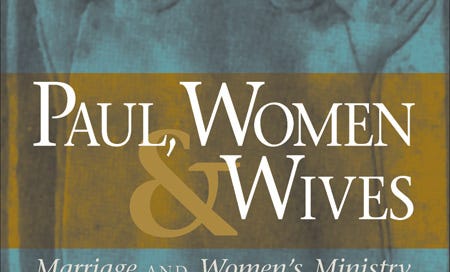The Theological Foundation for Why I Believe Women Can Serve as Pastors, Elders and Leaders in the Church
An Ongoing Deep Dive into "Paul, Women and Wives" by Craig S Keener
I am egalitarian. If you’re blissfully outside the evangelical bubble, that term may not mean much to you. Simply, egalitarians believe women can preach from the pulpit and fulfill leadership roles in the church, even if it means authority over men.1 Unfortunately, this is a minority position in most churches and denominational traditions. And because it is a minority belief, I think it’s important to equip folks with a WHY behind their support for women. A substantive, Scripture-based defense for egalitarian theology, principles and practices. While I don’t want to dig deeper trenches and enflame the kind of toxic arguments that destroy our souls (regardless of our position), it is good for our formation to have a deep foundation for why we believe what we believe.
Most women in ministry are experts in an egalitarian apologetic. They know how to defend themselves (and their peace) from the clobber verses and accusations complementarians (the opposition to egalitarians) direct, or sometimes hurl, their way. Listen to them. They grasp this better than me.
Instead, I’d like to invite anyone on this journey with me through Dr. Craig S. Keener’s excellent book Paul, Women & Wives to understand the biblical foundation for egalitarian theology. Dr. Keener lays out a compelling argument that maintains a high view for the authority of Scripture. He’s not relying on vibes or socially progressive logic to advocate for women, but instead the Bible used by billions of folks in churches every week And not just any scripture within said Bible… Keener addresses the writings of Paul, who has long been seen as a barrier to women at best or a misogynist at worst.
Our staff at CityChurch in San Antonio are going through this book in our book study, so I figured I’d share my notes and equip more folks.
You can order the book here, if you’d like to read along: https://www.amazon.com/Paul-Women-Wives-Marriage-Ministry/dp/0801046769\
You can also check it out at your local library. Or you can just follow along on this journey, which includes the podcast version on Better on the Inside.
Here are my notes for the preface, with some questions.
Preface
Keener calls the book an “exegetical study with pastoral implications”.
Exegetical comes from the word exegesis. Exegesis is “the process of careful analytical study of the Bible to produce useful interpretations of those passages.” (The word “exegesis” comes from the Greek term ἐξηγέομαι (exegeomai), which means “to explain” or “to narrate” or “to show the way”)2
That means his focus is more theological (interpreting what the Scripture says and understanding the historical context) than pastoral (applying the truth to our lives).
QUESTION: What is the difference between the theological and pastoral approaches?
He breaks down his responses into 3 categories: Gender Roles in Antiquity, Evangelical Debate and Hermeneutical Issues.
Gender Roles in Antiquity
Antiquity can be simply defined as “Ancient times”.3
Ancient women had diverse roles that sometimes were counter to cultural norms
Paul was somewhat “progressive”. He supported empowering women beyond cultural norms, but also respected or affirmed the dominant practices of culture.4
QUESTION: Why do you think Keener compares gender roles to slavery?
Evangelical Debate
This is the part that involves CityChurch and other churches more directly.
Evangelical = a worldwide interdenominational movement within Protestant Christianity that puts primary emphasis on evangelization.
CityChurch would be classified as egalitarian. That means women can preach, teach and lead in all areas of our ministry.
QUESTION: What have you ever heard about how women participate in ministry? Specifically, preaching and leading?
Hermeneutical Issues
Hermeneutics- the art and science of biblical interpretation
Literal, grammatical, historical
3 part reading
What the text meant for the people then
What the text means for all people for all time
What the text means for us now
QUESTION: How much experience do you have with Hermeneutics/biblical interpretation?
A brief survey of New Testament letters will indicate that, like letters today, they usually address people in particular historical settings (for example, “the saints at Rome,” “the church in Corinth,” or “Timothy”).5
Context is extremely important in how we interpret Paul’s letters or any other communication in the Christian Scripture.
Context = the surrounding circumstances.
This is largely the “historical” piece of interpretation.
QUESTION: what does the “cloak from Troas” in 2 Tim 4:13 have to do with this conversation?
“When you come, bring the cloak that I left with Carpus at Troas, and my scrolls, especially the parchments.”- 2 Timothy 4:13
I believe everyone created by God has been given gifts by the Holy Spirit and is called to use them.
Anchor Yale Bible Dictionary, “Exegesis” (Yale University Press, New Haven, CT), 1992. (via Logos.com https://logos.com/grow/what-is-exegesis-and-why-is-it-important/)
https://www.merriam-webster.com/dictionary/antiquity
Keener, Craig S.. Paul, Women, and Wives: Marriage and Women's Ministry in the Letters of Paul (p.8). Baker Publishing Group. Kindle Edition.
Keener, Craig S.. Paul, Women, and Wives: Marriage and Women's Ministry in the Letters of Paul (p. 22). Baker Publishing Group. Kindle Edition.





I’m hooked! I want to know more about what Paul meant in his comments about women in church.